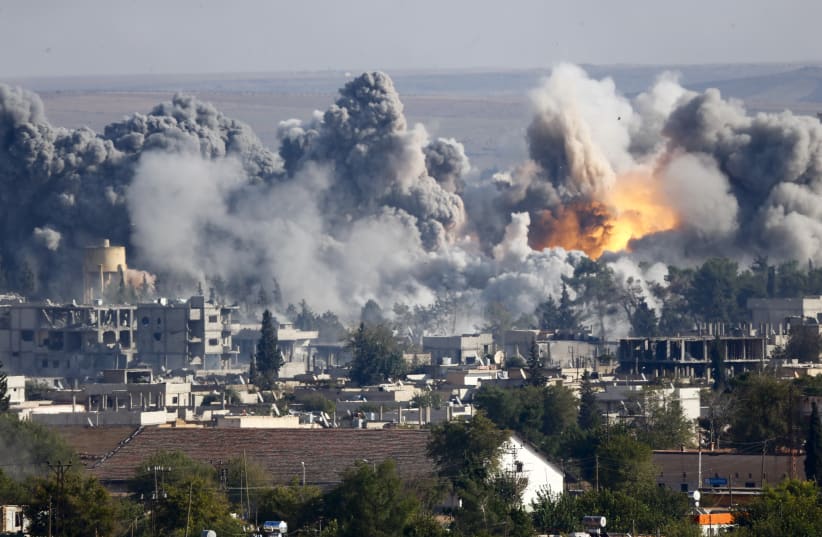
Turkey Strikes Iraqi and Syrian Targets Following Deadly Attack on Defence Firm
In a swift and decisive response to a recent attack on a prominent aerospace and defense company near Ankara, Turkey’s Air Force has conducted airstrikes targeting Kurdish positions in both Iraq and Syria. This military action marks a significant escalation in Turkey’s ongoing conflict with Kurdish groups, particularly the Kurdistan Workers’ Party (PKK), which Turkey holds responsible for the attack that left five individuals dead and over twenty injured.
https://www.cpmrevenuegate.com/vt6hstxc?key=785582df3563a5011d6a42a72f53041eh
The strikes were executed on Wednesday and reportedly destroyed 32 designated targets linked to the PKK. While the Turkish Ministry of National Defence has not disclosed specific locations of the strikes, they have assured that measures were implemented to minimize civilian casualties. This military operation comes on the heels of an assault carried out by suspected Kurdish militants, who detonated explosives and opened fire at TUSAS (Turkish Aerospace Industries), a state-run enterprise specializing in the design, manufacturing, and assembly of military and civilian aircraft, unmanned aerial vehicles (UAVs), and various defense systems.
In the aftermath of the attack on TUSAS, Turkish officials have made it clear that they hold the PKK accountable for the violence. Interior Minister Ali Yerlikaya and Defence Minister Yasar Guler both pointedly attributed the assault to the PKK. Guler emphasized the government’s resolve, stating, “We give these PKK scoundrels the punishment they deserve every time. But they never come to their senses. We will pursue them until the last terrorist is eliminated.”
The PKK has yet to release a statement regarding the attack on TUSAS or the subsequent Turkish airstrikes.
https://www.cpmrevenuegate.com/vt6hstxc?key=785582df3563a5011d6a42a72f53041eh
The timing of the airstrikes is particularly significant, as they follow recent discussions about the potential for dialogue with the PKK. Devlet Bahceli, leader of the Nationalist Movement Party (MHP), which is allied with President Recep Tayyip Erdogan’s Justice and Development Party (AKP), suggested that the imprisoned PKK leader Abdullah Ocalan could be granted parole if he renounces violence and disbands his organization. However, with the recent violence, questions loom over the possibility of peace talks or negotiations.
President Erdogan has condemned the attack on TUSAS, labeling it a “heinous terrorist attack” during a meeting with Russian President Vladimir Putin at a BRICS summit in Russia. His remarks underscore the Turkish government’s determination to combat what it considers terrorist threats.
The Iraqi embassy in Ankara has publicly condemned the attack on TUSAS, affirming Iraq’s strong stance against terrorism and its solidarity with the Turkish government. Earlier this year, Iraq imposed a ban on the PKK, highlighting the complex nature of regional politics and the shared concerns of both nations regarding Kurdish militancy.
https://www.cpmrevenuegate.com/vt6hstxc?key=785582df3563a5011d6a42a72f53041eh
Turkey has a longstanding policy of conducting military operations against the PKK, which has been engaged in a decades-long conflict seeking greater autonomy for the Kurdish population in southeastern Turkey. This conflict has resulted in tens of thousands of deaths since its inception in the 1980s, and the PKK is classified as a terrorist organization by Turkey and its Western allies.
The Impact of Turkish UAVs
The UAVs produced by TUSAS have been pivotal in bolstering Turkey’s military capabilities against Kurdish fighters. Their effectiveness in prior engagements has allowed Turkey to gain a tactical advantage in its operations, making the company a critical asset in the nation’s defense strategy. The recent attack on TUSAS not only represents a direct assault on Turkey’s defense infrastructure but also poses a broader threat to its military operations against Kurdish forces.
https://www.cpmrevenuegate.com/vt6hstxc?key=785582df3563a5011d6a42a72f53041eh
As the situation continues to unfold, the domestic political climate in Turkey remains tense. The country’s main pro-Kurdish party, the Peoples’ Democratic Party (HDP), has condemned the TUSAS attack, emphasizing that it coincided with a time when dialogue appeared feasible. The atmosphere surrounding this potential for peace is now overshadowed by the violence and the government’s hardline stance against the PKK.
The ongoing conflict raises essential questions about the future of Kurdish autonomy in Turkey and the potential for lasting peace in a region marked by decades of strife. Many observers are left wondering whether the recent escalation will further entrench divisions or if there remains a path toward reconciliation.
As Turkey escalates its military response against Kurdish targets in Iraq and Syria, the implications of these actions will reverberate not only within its borders but also across the region. The conflict with the PKK remains a complex and multifaceted issue, deeply intertwined with national security, regional stability, and the broader political landscape in Turkey. The airstrikes against Kurdish positions signal a commitment to confronting perceived threats but may also complicate efforts toward dialogue and peace. The coming days will be crucial in determining whether Turkey will continue down a path of military engagement or seek alternative means to address its long-standing issues with the Kurdish population.
In the aftermath of such a significant event, the eyes of the world remain fixed on Turkey as it navigates the delicate balance between security and diplomacy in an increasingly volatile regional context.

